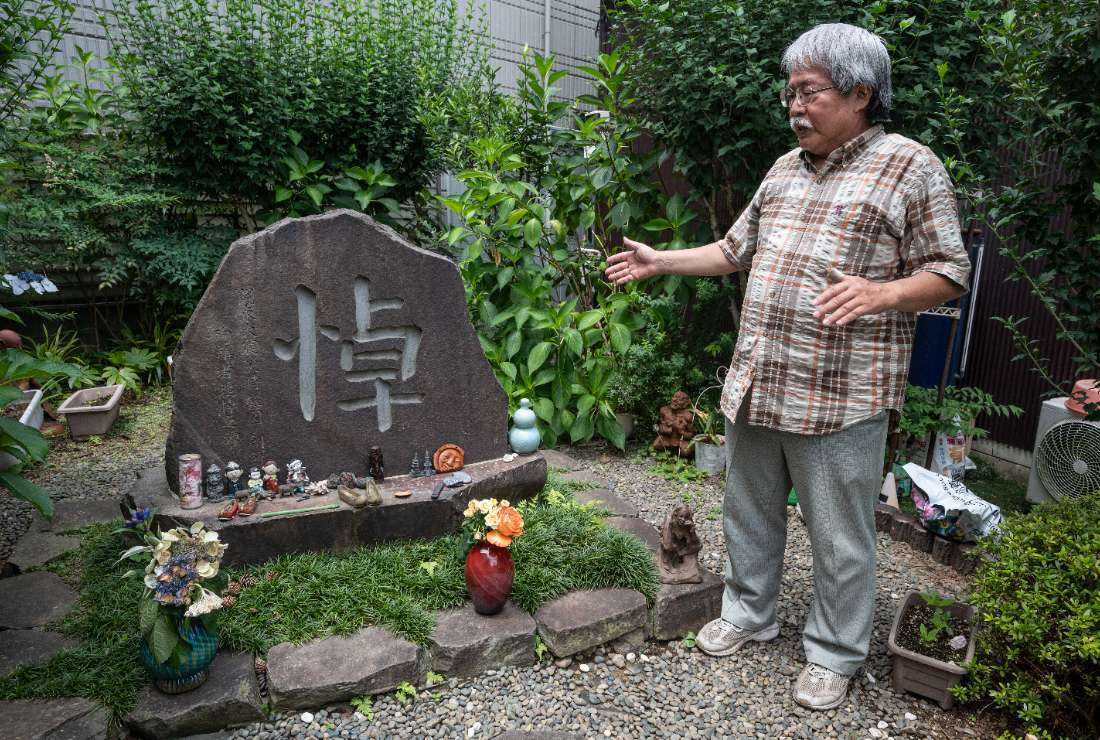
This photo taken on June 21 shows Masao Nishizaki, director of the Housenka Foundation - a civic group working on the events following the 1923 earthquake when many Korean residents were massacred - speaking about the memorial for the victims outside his home in Sumida Ward in Tokyo. (Photo: Richard A. Brooks/AFP)
South Korean Catholic bishops hailed a statement from Japanese bishops that called on Japan government to accept responsibility and uncover the truth behind the 1923 Kantō Massacre that left about 6,000 mostly ethnic Koreans killed.
In a press statement, the Committee for Social Affairs of the Catholic Bishops’ Conference of Korea (CBCK) lauded the Catholic Bishops’ Conference of Japan for “a truly meaningful voice,” Catholic Peace Broadcasting Corporation of Korea (CPBC) reported on Sept. 6.
This came ahead of the 100th anniversary of the massacre.
“We… thank the Japanese Catholic Church for courageously showing that facing the truth is the path to true peace,” the Korean bishops said.
“This statement invites all of us as ‘brothers’ to build a better world beyond race, nation, religion, and belief,” the statement read.
The Korean bishops also warned that the “unfortunate ‘yesterday’ that occurred because of being different from us can become ‘today’ at any time due to discrimination and hatred towards the socially underprivileged, including immigrants and refugees.”
The massacre in Japan’s Kantō region started on Sept. 1, 1923, after a major earthquake, and continued for about three weeks.
Military soldiers, police and vigilantes allegedly backed by the Japanese government murdered about 6,000 people, mostly ethnic Koreans but also Chinese and Japanese mistaken to be Korean, according to the Association for Asian Studies.
The 7.9-magnitude earthquake rocked the densely populated eastern and northeastern regions of Japan, including Tokyo, and killed over 100,000 and wiped out homes for around 2 million of Japan’s population at that time.
The massacre started after rumors spread that bands of lawless Koreans had set fires, looted shelters, shops, and vacant homes, and poisoned wells throughout the Kantō region which resulted in violence and killings.
Allegedly, the news of the massacres was initially tightly controlled. After several months, newspapers and journals published stinging critiques of the murderous events.
Tawara Magoichi, a prominent Japanese bureaucrat and politician, had called the crimes “deplorable,” suggesting that the disaster exposed “a major defect in the national spirit” of Japan in 1923.
Earlier, the Japanese bishops had issued a statement urging the Japanese government to “seriously confront the history of the massacre of Koreans in the Great Kanto Earthquake," CPBC reported.
The Japanese bishops had emphasized that it was urgent “to uncover the truth about national responsibility, apologize and compensate the victims’ families, disclose and permanently preserve materials, and expand history education without distorting this fact.”
“The Japanese government is not disclosing the names and numbers of the Korean and Chinese victims, only saying that it is investigating the actual situation,” the Japanese bishops said.
Allegedly, Tokyo has been downplaying the massacre despite having a plethora of eyewitness accounts of the events in 1923, media reports say.
Chief Cabinet Secretary Hirokazu Matsuno, the spokesperson representing the Japanese government, claimed that there were no records of the slaughter in government archives, Japan Posts reported.
Matsuno had said that “there are no records within the government that ascertain the facts” related to the Kantō Massacre.
The record of killing ethnic Koreans living in Kanto was omitted in a history textbook for third to sixth graders approved by the Japanese government, Korea JoongAng Daily reported.
Legislators of the two countries last week attended a memorial ceremony marking the 100th anniversary of the massacre.
Fukudamura Jiken, a film on the dark history of the 1923 massacre by Tatsuya Mori, was released in Japan on Sept. 1.


